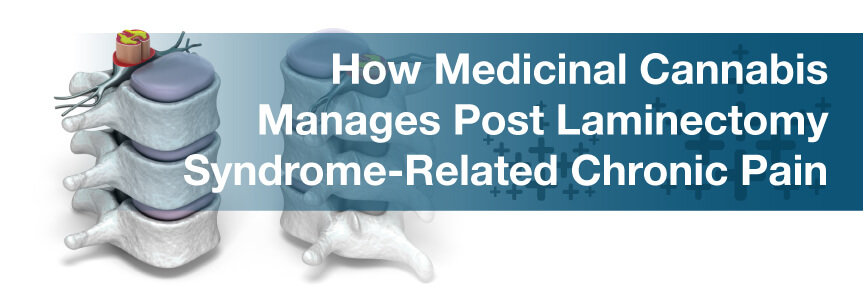
Disorders of the nervous system can be quite difficult to manage. Nerve pain and other related symptoms impair quality of life and can lead to strains in a patient’s work, mood and family life. Post laminectomy syndrome (PLS) can develop after a patient undergoes a spine surgery known as a laminectomy.
The procedure is performed to reduce painful symptoms caused by an impinged spinal cord. However, when PLS develops, patients are left in extreme discomfort. The only thing physicians can do is find ways for patients to help manage their pain as the nerves in the spinal cord heal.
This process can take quite some time, as damaged nerves heal very slowly. Medical marijuana is an alternative treatment option that’s now available in states throughout the U.S. Research is showing that what was once considered a “stoner drug” is actually an effective analgesic. It’s also a safer alternative to many prescription pain meds and can be used by patients with PLS-related chronic pain.
Laminectomies are spinal surgeries that are only performed when a patient is experiencing pain due to nerve compressions in the spine. During the procedure, the spine’s lamina, or protective covering, is removed. This creates more space in the spinal canal and puts less pressure on it.
Unfortunately, the main risks of this operation have painful consequences:
A patient can struggle with PLS-related pain for months, years or even indefinitely. When pain continues long-term in this way, it’s referred to as chronic pain. The doctor’s main goal at this point is to help patients manage their pain levels, giving their fragile nerves a chance to heal.
With the discovery of our body’s endocannabinoid system (ECS), the scientific world is realizing the potential of marijuana as medicine. For decades, patients would illegally obtain cannabis because they experienced how it relieved their painful symptoms.
We’ve only recently discovered the scientific data to back up their experience. The ECS has receptors in every major system that aid many bodily functions, including pain management, emotional health, digestion and more. Cannabis compounds bind to these same receptors, so if an issue is causing the body to experience debilitating symptoms, marijuana can provide relief. In fact, the compounds THC and CBD bind to receptors in the brain that regulate pain. Here, they can block neurotransmitters from sending pain messages.
Many pain medications can only deal with mild forms of pain, but cannabis can help patients manage pain of any type, even if it’s chronic and severe. Because of its multifaceted benefits, it can also help patients with PLS find relief in other areas, such as the insomnia or depression they may experience because of their chronic pain.
At MarijuanaDoctors.com, we want to help patients find the highest quality care available, but our advice should not replace that of a qualified professional. That’s why we want to connect you with a marijuana doctor or a dispensary in your state. They can answer your questions, offer you advice based on your specific circumstances and make sure you get the best treatments that match your needs.